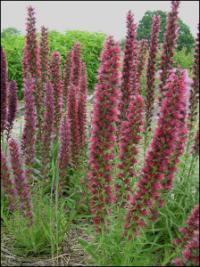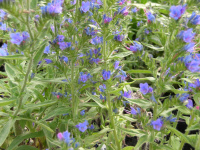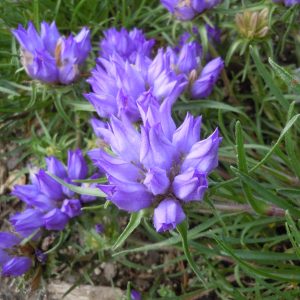Archives
Showing 73–80 of 199 results
-
Dracocephalum ruyschianum Northern dragonhead, Siberian dragonhead Z 4-8
Mound of deep sky blue, snapdragon-like flowers, July-September over narrow rosemaryish leaves
ARCHIVED
Note: This is a plant not currently for sale. This is an archive page preserved for informational use.
Mound of deep sky blue, snapdragon-like flowers, July-September over narrow rosemaryish leaves.
Size: 12- 18” x 12-18”
Care: sun to part shade in well-drained to moist well-drained soil
Native: China
Wildlife Value: Deer resistantCollected before 1753. Dracocephalum means “dragonhead” in Greek.
-
Dryopteris filix-mas ‘Parsley’ Male fern Z 4-8
Spring fiddleheads are followed by crinkled ferny leaves resembling parsley on arching stems on this small fern.
ARCHIVED
Note: This is a plant not currently for sale. This is an archive page preserved for informational use.
Spring fiddleheads are followed by crinkled ferny leaves resembling parsley on arching stems on this small fern.
Size: 2’ x 2’
Care: shade to part sun in moist well-drained soil, tolerates clay
Native: Europe and North America
Wildlife Value: provides shelter and habitat for birds and bees, Deer & rabbit ResistantDryopteris filix-mas collected before 1834, Victorian cultivar.
-
Echinacea purpurea Purple coneflower Z 3-8
Iconic dark pink rays with orange-rust cones from mid-summer to fall
ARCHIVED
Note: This is a plant not currently for sale. This is an archive page preserved for informational use.
Iconic dark pink rays with orange-rust cones from mid-summer to fall
Size: 3’ x 18”
Care: sun in well-drained humusy soil
Native: GA west to TX, north to NC, west to OH, IL & IA
Wildlife Value: Attracts many species of butterflies and bees; food for some moth and butterfly caterpillars; In fall Gold finches eat the seeds. Deer resistant.American Natives used Purple coneflower as a remedy for more ailments than any other plant, e.g. smoke treatment to cure headaches and sexually transmitted diseases, applied topically to toothaches and mumps and juice used for burns. The Winnebagos used the plant in advance to protect against burns. Also used to cure distemper in horses. Echinos is Greek for edgehog referring to the spiny cone. Introduced into garden cultivation by British John Tradescant the Younger from colonial Virginia in 1640.
-
Echium russicum Vipers bugloss Z 2-9
Striking spikes of wine red in early summer, deadhead to rebloom. Short lived.
ARCHIVED
Note: This is a plant not currently for sale. This is an archive page preserved for informational use.
Striking spikes of wine red in early summer, deadhead to rebloom. Short lived.
Size: 20" x 16"
Care: Sun in moist well-drained soil or well-drained soil. Deer resistant
Native: Russia & eastern EuropeBristly hairs on stems can cause skin irritation. Echium is Greek for Viper’s bugloss because a concoction of the root and wine supposedly cured snake bites or acc’d to Gardeners’ Dictionary 1768 “because the ripe seed of this plant resembles the head of a viper.”. Collected before 1791 by Johann Gmelin, German botanist, who spent 10 years in Russia searching for plants, nearly dying in the process.
-
Echium vulgare Vipers bugloss Self-sowing biennial Z 3-8
Spikes of true blue blossoms touched with a hint of pink, May through September
ARCHIVED
Note: This is a plant not currently for sale. This is an archive page preserved for informational use.
Spikes of true blue blossoms touched with a hint of pink, May through September. Self-seeds readily, considered noxious weed in Washington. Bristly hairs on stems can cause skin irritation
Can not ship to: Idaho, Maryland and Montana
Size: 2-3’ x 12”
Care: sun in most any soil
Native: Europe.
Wildlife Value: Important pollinator for bees.In past leaves boiled for a tea to remedy headaches and fevers. In mid-1700’s grew on chalky lands over most of England. Echium is Greek for Viper’s bugloss because a concoction of the root and wine supposedly cured snake bites or acc’d to Gardeners’ Dictionary 1768 “because the ripe seed of this plant resembles the head of a viper.”
-
Edraianthus pumelo Dwarf grassybells Z 5-8
June to July cushion of up-facing purple bells atop silvery leaves
ARCHIVED
Note: This is a plant not currently for sale. This is an archive page preserved for informational use.
June to July cushion of up-facing purple bells atop silvery leaves
Size: 1” x 3”
Care: sun in very well-drained soil
Native: Balkins
Awards: Royal Horticultural Society Award of MeritDescribed in 1819 and named as a Campanula. Name changed in 1839.
-
Edraianthus tenuifolius syn. Wahlenbergia tenuifolius Grassy bells Z 5-8
Clusters of upfacing blue-purple bells in June, with a base of grassy foliage.
ARCHIVED
Note: This is a plant not currently for sale. This is an archive page preserved for informational use.
Clusters of upfacing blue-purple bells in June, with a base of grassy foliage.
Size: 4” x 8”
Care: sun to part shade in well-drained soil
Native: Dalmatia in southern Austria (Balkans)Introduced to gardens by M. Fröbel of Zurich who sent it to Kew Botanical Garden where it flowered in 1819. The name Edraianthus comes from Greek meaning “without a stalk.” Tenuifolius means “slender leaved.”
-
Emily Dickinson Garden for sun
Emily Dickinson Garden for sun.
ARCHIVED
Note: This collection is not currently for sale. This is an archive page preserved for informational use.
Emily Dickinson Garden for Sun Size : Height x width* Bloom color
1 Alcea rosea – Hollyhock 2-3’ x 2’ varies
3 Aquilegia canadensis – Canada columbine 24-36”x 12” red
1 Aster novae angliae – New England aster 3-4’ x 24” pink or purple
3 Campanula rotundifolia – Harebell 9-12” x 8” blue
1 Clematis virginiana – Virgin’s bower (vine) 12-20’ x 4’ white
3 Geranium pratense – Meadow Cranesbill 24-36” x 24” bluish-violet
1 Iris siberica – Siberian iris 3-4’ x 12” purple
3 Lilium lancifoliuim – Tiger lily 3-4’ x 12” orange
1 Peony ‘Sarah Bernhardt’ 36” x 36” pink
3 Zizia aurea – Golden alexander 30″ x 24″ yellowAll plants are perennials except the Hollyhock which is a reseeding biennial.
If planted together in one garden these make a 30 square foot garden. **Most of these plants get wider over time by spreading roots or by self-seeding .





